⚡ZurzAI.com⚡
Companies Similar to Axelera AI
SiMa.ai

SiMa.ai creates chips for AI workloads at the edge, offering a "software-centric" platform for multimodal applications. SiMa.ai™ is a machine learning company delivering the industry’s first software-centric purpose-built MLSoC™ platform for effortless ML deployment and scaling at the embedded edge.
About | About | News | Leadership | Leadership | About
SiMa.ai is primarily focused on revolutionizing machine learning (ML) at the embedded edge. Their core offering is their Machine Learning System on Chip (MLSoC™), a purpose-built platform aimed at addressing varied computer vision challenges across multiple industry sectors, such as automotive, industrial, healthcare, drones, smart vision and retail, and the government sector.
Key Focus Area: The key focus of SiMa.ai is making ML "effortless" across diverse edge applications by providing high-performance, low-power solutions integrated within MLSoC™. With a push-button software experience, SiMa.ai targets complex scenarios in areas like autonomous vehicles, industrial automation, healthcare data processing, and smart retail, where energy efficiency and real-time processing are critical.
Unique Value Proposition and Strategic Advantage: SiMa.ai’s unique value proposition lies in their MLSoC™—a comprehensive, single-chip solution that supports a broad spectrum of models, including CNNs, Transformers, and Generative AI. Their strategic advantages include:
- Performance and Power Efficiency: Offering up to 10x better performance per watt compared to competitors, SiMa.ai addresses the industry's need for high throughput with reduced power consumption.
- Software-First Approach: By focusing on software-centric design, SiMa.ai allows for seamless, rapid deployment and iteration of ML models, making it user-friendly and adaptable for developers.
- Scalability and Versatility: Their platform accommodates future and legacy ML models, expanding its usability across multiple use cases and industries.
Delivering on Value Proposition: SiMa.ai operationalizes its value proposition through:
-
MLSoC Family and Board Solutions: Their offerings include the MLSoC Modalix, with configurations tailored for different performance needs (25 to 200 TOPS). This ensures adaptability to market demands for smart vision systems, drones, industrial automation, and smart cities.
-
Palette Software Platform: A dedicated software suite that simplifies the development, testing, and deployment of ML solutions across edge applications. This platform enables integration of custom ML solutions through a no-code/low-code approach, making it accessible and reducing the technical barrier for businesses.
-
Effortless Integration and Deployment: SiMa.ai’s solutions provide plug-and-play integration and are designed to be versatile enough to support multiple sensors and devices, all while ensuring secure data handling with built-in privacy features.
-
Strategic Partnerships: Collaborations with industry leaders like Synopsys and TRUMPF enhance SiMa.ai’s offerings in specific sectors like automotive and industrial applications, further cementing their foothold in these industries.
-
Customer-Centric Approach: Engaging actively with clients in over 50 leading companies, they strive for meticulous adaptation of their solutions to meet specific client needs.
In conclusion, SiMa.ai positions itself as a transformative player in the embedded edge ML market with its scalable, energy-efficient, and user-friendly approach ready to tackle complex computing challenges with speed and simplicity.
MicroAI

MicroAI provides AI-focused solutions for various industries, offering products like Machine Intelligence, Smart Connectivity, Security and Monitoring, Digital Factory, Launchpad, AIStudio, and Gen AI Knowledge Management primarily focusing on AI capabilities, telecom solutions, cybersecurity, manufacturing optimization, and knowledge management systems.
About | About | About | About | About | About | About | About | About | About | About | About | About
MicroAI focuses on providing advanced intelligence solutions for various industries by enhancing machine and device performance through Embedded/Edge AI and Machine Learning technologies. The company targets sectors like manufacturing, telecom, automotive, finance, and infrastructure, offering solutions that extend from machine intelligence to various facets of IT and OT asset optimization.
Key Focus Area: MicroAI's key focus is on optimizing the performance, reliability, and security of machines and devices across industries. By embedding AI and machine learning algorithms at the endpoint, MicroAI aims to make machines more transparent, providing real-time insights into their operations.
Unique Value Proposition and Strategic Advantage: MicroAI's value proposition lies in its edge and embedded AI solutions, which deliver:
- Enhanced machine transparency and performance insights.
- Predictive intelligence that minimizes downtime and maximizes output.
- A reduction in operational and maintenance costs through predictive maintenance.
Strategic advantages include:
- Providing a unified AI-enabled platform that integrates seamlessly with existing machine assets.
- Offering edge AI capabilities that reduce cloud dependency and improve data processing efficiency and security.
- Advancing zero-trust cybersecurity frameworks that protect against sophisticated cyber threats directly at the endpoint level.
Delivery on Value Proposition: MicroAI delivers its value proposition through several key methods:
-
Machine Intelligence Platform: This platform enables deeper insights into machine performance through advanced embedded AI technologies. It includes features like endpoint-based performance monitoring, predictive analytics, and intelligent workflows for operational automation.
-
Smart Connectivity: The Telecom-focused solutions provide orchestration capabilities that optimize network quality of service, create new revenue streams, and increase system sustainability. Machine learning is used to enhance device lifecycle management and accelerate market entry.
-
Security and Monitoring: Applying AI for cybersecurity, MicroAI offers rapid threat detection and mitigation strategies that drive a zero-trust security model, ensuring robust protection against cyber-attacks.
-
Digital Factory and AIStudio: These integrated solutions cater to manufacturing needs by revolutionizing factory performance, enabling predictive maintenance, and improving overall equipment effectiveness (OEE), all through AI visualization and tuning.
-
Gen AI Knowledge Management: This system utilizes generative AI to efficiently manage and analyze organizational knowledge, transforming data into actionable insights.
By consolidating these technologies into a coherent AI-enabled ecosystem, MicroAI claims to deliver reduced operational complexity and costs, improved performance metrics, and innovative solutions tailored to specific industry needs.
Vectra AI

Vectra AI specializes in AI-driven cybersecurity, providing network detection and response solutions to help organizations detect and respond to cyber threats in real time.
Vectra AI is a cybersecurity company specializing in AI-driven threat detection and response platforms. Their platform utilizes integrated signals for extended detection and response (XDR) to enhance security across networks, identities, clouds, and endpoints. Key offerings of Vectra AI include Managed Extended Detection and Response services (MXDR) which integrate with various technologies to monitor and mitigate advanced threats like ransomware, data breaches, and nation-state attacks.
Key Components of Vectra AI's Platform:
-
Attack Signal Intelligence: Vectra AI's core capability involves real-time analysis to detect and respond to threats by monitoring hybrid and more complex IT environments.
-
Network Detection & Response (NDR): Aimed at identifying threats within network activity, NDR helps stop attacks by analyzing behavior in real-time across on-premises, cloud, and IoT/OT networks.
-
Identity Threat Detection & Response (ITDR): Focuses on protecting identity-related attacks by monitoring Active Directory and Microsoft Entra ID, decreasing exposure to identity misuse and enhancing threat visibility.
Use Cases:
Vectra AI’s platform supports several security use cases, including:
- SOC Modernization: Enhancing Security Operations Centers (SOCs) efficiency through better threat detection and reduced response times.
- SIEM Optimization: Reducing the costs and complexities associated with Security Information and Event Management systems.
- EDR Extension and IDS Replacement: Extending Endpoint Detection and Response (EDR) capabilities and replacing traditional Intrusion Detection Systems (IDS) with more advanced solutions.
- Cyber Resilience and Risk Management: Strengthening defenses and managing risks in critical infrastructures, remote workforces, and operational technology (OT) environments.
Industry Applications:
Vectra AI serves various industries by providing customized cybersecurity solutions, including:
- Banking & Finance
- Government & Federal sectors
- Telecommunications
- Healthcare
- Manufacturing
Threat Types Addressed:
Vectra AI addresses a wide range of threats such as:
- Ransomware: It detects and counters ransomware attacks before they start.
- Advanced Persistent Threats (APTs): Identifying sophisticated entities hiding in organizations.
- Supply Chain Attacks and Nation-State Attacks: Protecting networks from broader geo-political cyber threats.
Research and Insights:
Vectra AI invests heavily in research, providing insights into emerging threat vectors, and offering thought leadership in the domain of cybersecurity. This includes engagement in Attack Labs where 11+ years of AI research and expertise are shared with the global cybersecurity community.
Recognition and Industry Standing:
Vectra AI has been recognized by several industry experts and evaluations such as Gartner and IDC, being highlighted for its leadership in Network Detection and Response (NDR). The company is noted for its comprehensive coverage, expert insights, and rapid response capabilities which are crucial in managing evolving cyber threats.
Collaborative Partnerships:
Vectra AI works closely with technology partners to build a robust ecosystem that supports integrated threat detection and response strategies. This includes partnerships with major technology firms and participation in various cybersecurity frameworks and standards stages like NIST and Zero Trust.
Vectra AI Initiatives:
Innovative solutions include the AI Scholars Program to advance cybersecurity knowledge using AI, and collaborations to enhance security across hybrid and multi-cloud environments. The company also conducts numerous webinars, workshops, and publishes regular blogs and resource materials to keep the community informed and educated.
Through its robust AI-driven platform, Vectra AI provides essential tools for organizations to detect and manage sophisticated cyber threats more effectively across diverse IT infrastructure and environments.
Apera AI

Apera AI specializes in developing 4D vision technology for industrial robotics to improve the reliability and productivity of vision-guided robotics. Their technology includes products like Apera Vue robotic vision software and Forge Lab AI simulation.
Apera AI is an organization focused on enhancing factory productivity by providing robots with advanced vision capabilities akin to human vision. Their core offerings include AI-driven robotic vision software, particularly through products like Vue software, 4D Vision technology, and Forge Lab AI training & simulation environments, each designed to improve the reliability and productivity of vision-guided robotics in various industrial applications.
Main Technologies and Products:
-
Apera Vue Software: A robust AI-driven robotic vision system empowering robots with advanced object recognition and path planning capabilities. The Vue software is noted for its ability to operate in diverse lighting conditions and its compatibility with major robot brands, providing enhanced performance in tasks such as bin picking, assembly, and machine tending.
-
4D Vision Technology: Uses AI to create a 3D understanding from 2D camera inputs, enabling robots to interact with their environment with a high level of precision and reliability. It is designed to function in all lighting conditions without the need for special equipment.
-
Forge Lab: A web-based AI training and simulation platform facilitating the setup and testing of vision-guided robotic cells. This platform aims to minimize risk and time in developing complex robotic systems without the need for hardware, showcasing Apera AI's commitment to making automation accessible and efficient.
Applications and Industries:
Apera AI's technologies are applicable across various industries including automotive, medical devices, life sciences, and metal fabrication. Key applications of their vision-guided robotics include:
-
Bin Picking: A complex task made efficient with AI-powered vision, allowing for fast and accurate sorting and handling of diverse objects, including clear and shiny items.
-
Robotic Assembly and Guidance: Automates complex assembly processes and provides precise guidance for robotic operations, improving productivity and reducing manual intervention.
-
Machine Tending: Automates the feeding and removal of parts in CNC or laser marking machines, optimizing labor usage and ensuring consistent productivity.
-
Sorting and Packaging: Assists in sorting delicate and similar-looking objects with accuracy, enhancing speed and precision in packaging operations.
Strategic Partnerships and Ecosystem:
Apera AI collaborates with a network of robotics partners, integrators, and distributors, broadening its reach and ensuring robust support for implementation. The compatibility of Vue software with various robot brands, such as ABB, FANUC, and Universal Robots, supports diverse applications across different industries.
Company Philosophy and Culture:
-
Innovation and Expertise: Apera AI is led by a team with deep expertise in AI, machine learning, and robotics, dedicated to driving improvements in manufacturing.
-
Technological Impact and Investment in People: Encourages a culture of scientific inquiry and real-world problem-solving, valuing diverse perspectives and continuous learning.
Customer Engagement and Success Stories:
Notable projects, such as those with Linamar Corporation and Flex-N-Gate, illustrate Apera AI's effective integration of robotic vision solutions leading to significant enhancements in production efficiency and quality standards.
Growth and Career Opportunities:
Apera AI is rapidly expanding in the AI and automation sector and invites individuals passionate about cutting-edge technology and problem-solving to join their team, offering roles that contribute directly to pioneering industrial automation solutions.
Overall, Apera AI is positioning itself as a significant facilitator of advanced robotics in manufacturing, with a distinct focus on leveraging AI for revolutionary improvements in reliability, flexibility, and productivity across global industries.
LeapMind
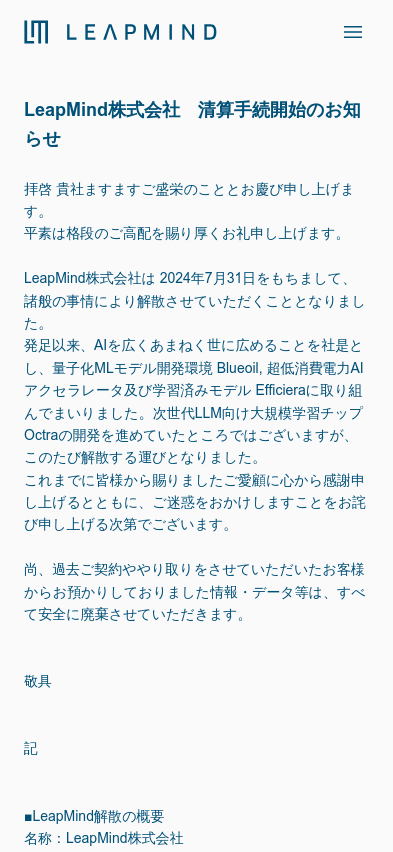
LeapMind researches original chip architectures to implement Neural Networks on a circuit with low power.
LeapMind Inc., a company focused on AI technology and solutions, has announced its dissolution effective July 31, 2024. This decision is attributed to various unspecified circumstances, despite efforts in developing AI solutions such as the quantization machine learning model development environment "Blueoil," ultra-energy-efficient AI accelerators, and pre-trained models under the brand name "Efficiera." The company also engaged in the development of large-scale learning chips, such as "Octra," designed for next-generation large language models (LLMs).
Key Developments and Products:
-
Efficiera Technology:
- Efficiera IP: This ultra-low power AI accelerator IP achieved leading performance in power, performance, and area efficiency. It facilitates effective AI model deployment on edge devices, marking a goal of 107.8 TOPS/W (Tera Operations Per Second per Watt).
- Efficiera Models: The development of models focused on extreme quantization, reducing bit representation down to 1-bit, which allows AI models to function effectively on edge devices with constrained computing resources and power.
- Efficiera SDK: A comprehensive AI software suite that includes tools for compiling AI models and deploying applications in production environments on edge devices. The SDK provides libraries and tools for extreme quantization and efficient AI model execution.
-
AI Solutions and Applications:
- Image Processing Applications:
- High-accuracy noise reduction and image enhancement, applicable to several domains such as smartphone cameras and industrial imaging.
- Techniques like image deblurring and super-resolution, enabling clearer image and video quality, particularly in challenging conditions.
- Image Recognition Applications:
- Object detection models capable of high-speed inference on edge devices, supportive of various sectors including surveillance and transportation.
- Segmentation and pose estimation technologies enabling detailed analysis and categorization of images in applications such as autonomous driving and industrial inspection.
- Anomaly detection models that identify irregularities from learned normal patterns, aiding in quality control and safety monitoring.
- Image Processing Applications:
-
Additional AI Technologies:
- The company advanced its offerings with application-specific performance tuning, allowing the extraction of maximum efficiency and speed from models deployed on minimal hardware, such as FPGAs.
- LeapMind's technology aims to integrate deep learning capabilities into compact devices across diverse industries, from consumer electronics to heavy machinery.
LeapMind has communicated that any customer data held as part of past contracts will be securely disposed of following ethical and legal standards. The company's efforts to address contemporary challenges such as high semiconductor costs and performance stagnation through its innovative AI solutions were integral to its mission of making AI accessible and user-friendly for widespread implementation. Despite its closure, LeapMind’s advancements in AI technology have contributed to potential efficiency improvements and increased AI capabilities at the edge.
Hailo

Hailo develops edge AI processing solutions, including accelerators and vision processors, to optimize deep learning applications across automotive, security, and industrial sectors.
Hailo Technologies Ltd. focuses on developing advanced AI processors specifically designed to enable AI on edge devices, enhancing performance while maintaining efficiency. Here's an overview of their main offerings and contributions:
Products:
-
AI Accelerators: These are co-processors designed to integrate with edge platforms, supporting real-time deep learning inference with low power consumption and cost efficiency. Key accelerators include:
- Hailo-8 & Hailo-8L AI Accelerator Modules: Available in various form factors like M.2 and mPCIe for different needs, offering up to 26 and 13 TOPS respectively.
- Hailo-8 Century High Performance PCIe Card: Delivers up to 208 TOPS for high-efficiency edge AI video analytics.
- Hailo-10H M.2 Generative AI Acceleration Module: Geared towards generative AI, supporting heavy AI models with minimal resource consumption.
-
AI Vision Processors:
- Hailo-15 Series: Tailored for smart cameras and includes variants like Hailo-15H, Hailo-15M, and Hailo-15L, offering enhanced AI analytics and video capabilities.
Software:
- Hailo AI Software Suite: Provides tools like the Dataflow Compiler for deploying neural network models efficiently on Hailo hardware.
- Developer Support: Extensive support for AI frameworks such as TensorFlow, ONNX, PyTorch, and more.
Technology and Innovation:
- Dataflow Architecture: A distinctive technology that enables efficient utilization of neural networks by adapting to their structure, which optimizes resource use and computational power.
Quality and Reliability:
- Quality Standards: Adopts ISO standards for quality management and environmental sustainability.
- Product Lifecycle Management: Ensures a lifecycle of 5 to 15 years and provides change notifications to manage product longevity and transitions.
Partner Ecosystem:
- Collaborates with hardware and software partners across various regions and segments to provide integrated solutions.
Applications:
Hailo’s processors are applicable in diverse sectors, including:
- Automotive: Advanced Driver Assistance Systems (ADAS), autonomous driving.
- Security and Surveillance: Intelligent transportation, access control, and perimeter protection.
- Retail and Industrial Automation: From point-of-sale systems to automated inspection and sorting.
- Generative AI: For applications requiring complex AI workloads.
Blogs and Resources:
Several articles highlight the key benefits and applications of edge AI technologies offered by Hailo, including:
- Balancing Privacy and Public Safety: Discusses edge AI as a solution for privacy-sensitive security applications, minimizing data transmission by processing locally.
- AI Smart Cameras: Explores how AI enhances camera capabilities, improving both video quality and analytics for various real-time applications.
Company Insights:
Hailo emphasizes a commitment to high-quality, reliable solutions while focusing on customer and environmental needs. They are proactive in customer feedback integration and continuous process improvement.
Partnerships & Customer Case Studies:
- Collaborations with companies like LeddarTech and engagements with partners in the intelligent transportation and surveillance sectors demonstrate the adaptability and scope of Hailo’s offerings.
Hailo Technologies aims to drive innovations in AI processing at the edge, making AI more accessible and impactful across industries while addressing privacy and efficiency concerns.
Ankar
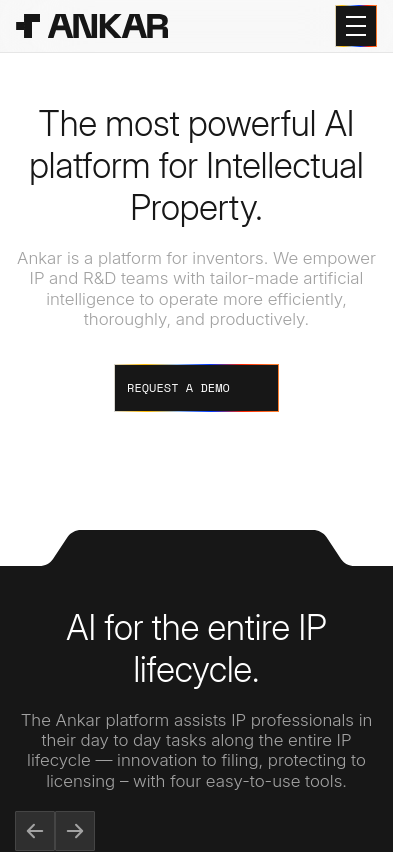
Ankar's AI engine safeguards intellectual property by protecting and maximizing IP assets like patents, trademarks, and designs.
Ankar.ai is focused on the intersection of cybersecurity and information technology, specifically addressing security threats in the digital landscape. The company develops technology solutions that aim to safeguard businesses from potential cyber threats, which are increasingly prevalent in today's interconnected world.
Key Focus Area:
- Ankar.ai specializes in cybersecurity solutions designed to enhance digital security frameworks for organizations.
- Their primary focus is on creating advanced algorithms and software designed to preemptively identify and mitigate security vulnerabilities, thereby safeguarding sensitive data and maintaining operational integrity.
Unique Value Proposition and Strategic Advantage:
- Ankar.ai’s unique value proposition lies in their utilization of artificial intelligence and machine learning to automate the detection of cybersecurity threats. This integration of AI allows for more efficient and quicker responses to potential security breaches compared to traditional methods.
- Their strategic advantage is further emphasized by their proprietary technology, which is tailored to predict and counteract cyber threats before they can infiltrate a business's IT infrastructure. This approach not only reduces the risk of breaches but also lowers the operational costs associated with manual security checks.
Execution of Value Proposition:
- The company delivers on its value proposition by offering a suite of AI-powered tools and services that continuously monitor and analyze network activity to detect anomalies indicative of cyber attacks.
- They provide customizable solutions that can be adapted to the specific needs and security protocols of different industries, thereby offering tailored protection strategies.
- Ankar.ai also enhances its solutions through constant updates and improvements based on the evolving nature of cyber threats, ensuring that their technology remains relevant and effective against the latest security challenges.
- Education and training form part of their strategy, as they aim to equip teams with the necessary knowledge to utilize their software effectively, thus maximizing ROI for their clients.
In summary, Ankar.ai's primary focus is on the provision of AI-driven cybersecurity solutions that preemptively protect business infrastructures from evolving threats. Their use of advanced technology serves as their strategic advantage, positioning them as a provider of proactive cybersecurity measures. By continually refining their offerings to suit individual organizational requirements, they ensure their solutions remain effective and relevant in an ever-changing digital threat landscape.
Wexler AI

Wexler AI is a UK-founded GenAI legaltech startup that uses large language models to automate essential fact-checking and intelligence gathering in legal disputes.
Executive Summary of Wexler AI
1. Key Focus Area
Wexler AI specializes in artificial intelligence-driven solutions for legal and fact-intensive industries, including law firms, compliance units, eDiscovery, tax, and forensics teams. The company's primary objective is to expedite and accurately analyze large sets of data to establish factual narratives critical for complex legal cases and other professional domains.
2. Unique Value Proposition and Strategic Advantage
- AI-Powered Fact Intelligence: Wexler positions itself as a platform designed to extract, verify, and analyze facts with high accuracy, leveraging AI to transform the litigation process and enhance decision-making.
- Efficiency and Accuracy: By automating routine yet intricate tasks in disputes, such as data extraction and evidence analysis, Wexler promises significant time savings, purportedly reducing manual review loads by approximately 90% based on user feedback.
- Cutting-Edge Security Protocols: The company provides enterprise-grade security with ISO27001 certification and other robust measures to ensure data protection and customer trust.
3. Delivery Methodology
Wexler employs several strategic methods to deliver its value proposition effectively:
- AI Agent - KiM: A specialized AI agent designed for complex, multi-step tasks, assisting legal teams in drafting documents, analyzing data, and building case timelines. This agent is designed to mimic the thoroughness of experienced litigators.
- Integration and User Experience: Implementations are designed to be smooth and efficient, with deep learning models capable of providing user-end insights such as prepared summaries, chronological event outlines, and data extraction of critical facts.
- Collaborations and Partnerships: By working with major law firms like Burges Salmon and Clifford Chance, Wexler claims to continuously enhance its platform capabilities through partnership-driven innovation.
- Security and Compliance: Ensuring security is maintained through rigorous standards, including single sign-on (SSO), regular penetration testing, and customer data storage options tailored for sensitive information.
- Ongoing Support and Adaptation: Wexler focuses on rapid growth and adaptation, constantly onboarding new clients and improving its functionalities to meet evolving industry needs.
Conclusion
Wexler AI presents itself as a pivotal tool in the automation and enhancement of legal processes, specifically focusing on fact analysis and data management. With a clear emphasis on accuracy, efficiency, and security, its offerings are tailored to streamline workflows for high-stakes legal disputes and similar contexts. The company's strategy hinges on combining advanced AI solutions with thorough security measures to foster trust and reliability among global legal teams. Though these claims are self-promotional, they highlight the company's efforts to redefine dispute resolution practices through technological integration.
Ambient.ai

Ambient.ai is a computer vision intelligence company enhancing enterprise security by using AI to prevent incidents before they occur. They apply advanced computer vision intelligence to existing camera and sensor infrastructures to automate security monitoring and resource dispatching efficiently.
Key Focus Area:
Ambient.ai concentrates on transforming physical security systems by leveraging the power of artificial intelligence and computer vision technologies. Their offerings primarily focus on enhancing safety through innovative software solutions that provide threat detection and response, signals intelligence, forensics, gun detection, and occupancy insights.
Unique Value Proposition and Strategic Advantage:
The company's unique value proposition lies in its use of AI and computer vision to deliver automated and precise threat detection capabilities. This approach seeks to improve physical security operations by reducing human error and enabling proactive measures against potential threats. Ambient.ai positions itself strategically by offering intelligence-driven solutions that aim to optimize security outcomes while minimizing response times and alert fatigue through advanced video analytics and integrated security platforms.
How They Deliver on Their Value Proposition:
-
Platform Capabilities:
- Threat Detection & Response: Ambient.ai provides a framework for monitoring and identifying threats in real-time. It focuses on proactive threat assessments and rapid decision-making to mitigate possible incidents.
- Signals Intelligence: The platform aggregates data from various sources to deliver actionable intelligence, accentuating the role of AI in interpreting and acting on complex security signals.
- Forensic Analysis: Advanced AI models enhance investigative processes, allowing for comprehensive post-incident reviews and identifying improvements for future prevention.
- Gun Detection and Occupancy Insights: Specialized features include gun detection applications and managing occupancy levels to maintain security compliance, especially in sensitive environments.
-
AI Integration:
- Their systems are integrated with AI-powered forensics, which streamline investigations, and access control systems, automating threat detection and response mechanisms. This integration seeks to foster collaborative incident management among security teams.
-
Customer Engagement:
- Ambient.ai showcases success stories, including partnerships with corporations like VMware and institutions such as The Harker School, indicating their broad applicability across diverse contexts, from corporate campuses to educational facilities.
- Alliances with partners like Brivo and Axis Communications further enhance their reach by providing integrated solutions for more effective workplace security.
-
Resource Provision:
- The company maintains a Resource Hub, a centralized location for educational content, allowing customers to learn about optimizing their security posture. This includes webinars, guides, and case studies on using AI for physical security enhancements.
-
Commitment to Innovation:
- Ambient.ai continually updates its platform with new capabilities such as weapon and early-warning detection. It remains focused on addressing contemporary security challenges, including workplace violence and perimeter security, through ongoing enhancements and development of new threat signatures.
In conclusion, Ambient.ai targets the physical security market by offering AI and computer vision software designed to reduce response times and enhance the operational efficiency of security teams. Their strategic use of technology aims to transform how businesses and institutions manage physical security, emphasizing the importance of automation and intelligence in contemporary threat detection and response.
Axelera AI

Axelera AI specializes in AI acceleration for edge computing applications, with a platform called Metis for handling computer vision inference.
Axelera AI is primarily focused on delivering high-performance AI hardware acceleration solutions designed for edge computing. Their key focus areas include generative AI, computer vision inference, and making AI accessible and efficient across various markets, including security, retail, industrial, and automotive sectors.
Unique Value Proposition and Strategic Advantage:
-
AI Acceleration Hardware: Axelera AI's Metis platform, including AI Processing Units (AIPUs) and acceleration cards like PCIe and M.2, claims to deliver unprecedented performance with high throughput and low energy consumption.
-
Integrated Hardware and Software Solutions: The company's offer encompasses hardware paired with an easy-to-use software stack, the Voyager SDK, which simplifies the deployment of AI models. This combined offering emphasizes usability, power efficiency, and cost-effectiveness.
-
Digital In-Memory Computing Technology: Axelera AI prides itself on using Digital In-Memory Computing (D-IMC) and RISC-V dataflow architectures. This technology minimizes data movement between memory and compute units, supposedly overcoming traditional memory bandwidth constraints and power inefficiencies.
-
Partnership and Ecosystem: Collaborations with companies like Arduino aim to enhance the accessibility of AI at the edge. By leveraging Arduino’s open-source community and Axelera’s hardware acceleration, the partnership aims to democratize AI innovations for a broader audience.
Delivery on Value Proposition:
-
Product Offerings: The Metis Compute Board and Accelerator Cards provide comprehensive solutions for AI inference at the edge. These products aim to bridge the gap between cutting-edge AI technology and practical implementation by offering ready-to-deploy systems that require minimal additional development from users.
-
Cost and Power Efficiency: Axelera’s technology is touted as being significantly more energy-efficient and cost-effective compared to traditional AI solutions like GPUs. This is achieved through their specialized architecture and quantization techniques that enhance output without compromising accuracy.
-
Flexible and Scalable Platform: Through the Metis evaluation systems, Axelera AI caters to a wide array of applications, including video analytics and quality inspection, capable of handling multiple high-resolution video streams simultaneously. The scalability of the platform allows it to integrate seamlessly with existing systems, enhancing its practicality and future-proofing capabilities.
-
Strategic Geographic and Market Expansion: With significant investment backing, Axelera AI plans to broaden its market reach into North America, Europe, and the Middle East. This expansion strategy aims to support the growing demand for efficient AI solutions and support computing needs across various new application domains including automotive and digital health.
-
Client Engagement and Community Building: Through events, partnerships, and an online store, Axelera AI encourages engagement, offering personalized demonstrations of their technology to drive client and community uptake.
Axelera AI is positioning itself as a key player in the edge AI space, focusing on hardware that claims to deliver high efficiency and performance while addressing cost and power consumption challenges. Their strategic partnerships and planned expansions underscore a commitment to evolving with market demands and enhancing AI accessibility globally.
Gyrus AI

Gyrus AI is a company specializing in the use of artificial intelligence, machine learning, and advanced computer vision to provide solutions that enhance offline retail and smart store technologies. Their offerings include advanced analytics to help brick-and-mortar stores understand customer behavior, improve store performance, and remain competitive with online counterparts.
Gyrus AI focuses on advanced video analytics using artificial intelligence (AI) and machine learning (ML) technologies. The company's primary goal is to enhance productivity and decision-making through sophisticated video processing tools tailored for business needs.
Key Focus Area: Gyrus AI specializes in providing AI-driven solutions designed for video content management. Key offerings include:
- In-Scene Ad Placement for seamless advertising integration into video content.
- Media Asset Management Search that uses AI for efficient video retrieval from large libraries.
- Video Anonymization to ensure privacy and compliance with data protection regulations.
- Vision Analytics utilized for object detection and smart insights from video content.
Unique Value Proposition and Strategic Advantage: The company's value proposition is centered around augmenting traditional video processing capabilities with AI to make media handling smarter, faster, and more privacy-conscious. Gyrus AI's strategic advantage lies in:
- Offering proprietary AI models that enhance video search, ad placement, and data anonymization.
- Providing tools that ensure GDPR compliance, reflecting a strong emphasis on data privacy.
- Implementing scalable and flexible AI solutions that integrate easily into existing business workflows.
Delivery of Value Proposition: Gyrus AI delivers its value proposition through several key strategies:
- Technological Integration: The provision of developer-friendly APIs ensures smooth integration with existing systems, allowing companies to leverage AI technologies without overhauling their current IT infrastructure.
- Smart Ad Placement: Using sophisticated AI to place 2D and 3D ads naturally into video content enhances viewer engagement by inserting ads in a way that does not disrupt the viewing experience.
- Efficient Video Search and Retrieval: AI-powered Media Asset Management provides advanced search functionalities, utilizing automatic tagging and knowledge graphs for improved content discovery and retrieval efficiencies.
- Automated Video Anonymization: With tools that blur sensitive information, Gyrus AI ensures compliance with global data protection standards like GDPR. This capability supports industries with strict privacy regulations, mitigating risks in data processing.
- Vision Analytics: Provides insightful analytics from video frames, enhancing data-driven decision-making processes for businesses with advanced detection and monitoring capabilities.
- AI as a Service: This phased deployment model ensures tailored AI model application according to customer data and requirements, enhancing specific business operations such as data preparation and model development.
By focusing on AI-intensive solutions for video analytics and business intelligence, Gyrus AI positions itself as a technology partner enabling efficient, secure, and insightful media content management. They harness AI’s potential to transform traditional methods of media handling into more effective and automated processes, driving productivity and compliance for businesses across various sectors.
AI EdgeLabs
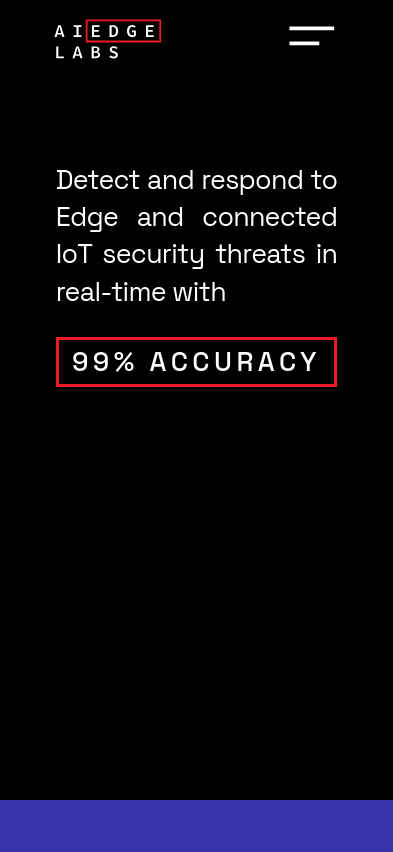
AI EdgeLabs is a startup that specializes in cybersecurity for edge computing and distributed Linux environments, offering Linux-based EDR and NDR solutions for comprehensive threat detection and proactive response.
Executive Summary
AI EdgeLabs focuses on providing cybersecurity solutions specifically tailored for Edge and IoT environments. Their primary objective is to secure these systems against various threats such as malware, ransomware, DDoS, and botnets. The solutions are designed to automate response and offer real-time protection and remediation.
Key Focus Area
The company's core focus is on delivering cybersecurity for Edge and IoT infrastructures. This includes high-risk industries such as Retail, Telecom, Automotive, Oil & Gas, Transportation, Healthcare, Manufacturing, Agriculture, and Smart Cities. They emphasize the unique vulnerabilities and security challenges of Edge computing, particularly in environments that are often decentralized and lack robust digital security.
Value Proposition and Strategic Advantage
AI EdgeLabs presents a unique value proposition by offering autonomous cybersecurity powered by AI, utilizing machine learning and reinforcement learning models. Their strategic advantage lies in their ability to detect zero-day threats and provide a real-time response mechanism. Key features include:
- Autonomous Threat Detection: Utilizing AI models to identify and act on threats without needing prior labeling, enabling rapid and efficient response.
- Threat Analysis and Anomaly Detection: Through behavior-based analytics and reinforcement learning algorithms, they can offer advanced threat monitoring and severity-based prioritization.
- Centralized Management: Their platform offers full visibility through a centralized dashboard, aiding in lifecycle support for threat disposition and mitigation.
Implementation of Value Proposition
AI EdgeLabs delivers on its promises through several strategic approaches:
-
AI-Powered Platforms: The AI EdgeLabs Sensor is a proprietary telemetry agent deployed at Edge nodes, offering continuous network analysis and threat modeling to secure infrastructures.
-
Comprehensive Coverage and Scalability: AI EdgeLabs can be integrated with various partner platforms like Sunlight, Supermicro, and OnLogic, ensuring broad compatibility and scalability. Its integration extends to various installation environments, including Kubernetes and Linux-native setups.
-
Partnerships and Integration: The company partners with major technology providers such as AWS, Sunlight, and Lenovo to advance edge cyber defense, offering seamless integration and comprehensive protection across distributed edge environments.
-
Security Features: The platform includes network visibility, automated incident response, and integration with diverse security information and event management (SIEM) systems, supporting a spectrum of cybersecurity operations.
Conclusion
AI EdgeLabs leverages its proprietary technology and strategic partnerships to address the emerging challenges in Edge and IoT security. By focusing on automation, AI technology, and real-time threat mitigation, the company positions itself as a prominent provider of security solutions capable of protecting intricate infrastructure across various high-stakes industries. While their claims are forward-thinking, it is essential to consider them as strategic marketing from the company itself.
Axelera

Axelera is working to develop AI acceleration cards and systems for use cases like security, retail and robotics.
Key Focus Area
Axelera AI is dedicated to advancing AI technologies with a focus on edge computing solutions. Their primary industry application is in accelerating inferencing for computer vision tasks within edge devices. They aim to enable efficient, cost-effective, and high-performance AI solutions specifically tailored for applications in the security, retail, and industrial sectors, among others. This approach allows users to process data insights rapidly and efficiently without the constraints typically associated with traditional cloud-based AI systems.
Unique Value Proposition and Strategic Advantage
Axelera AI's distinctive advantage lies in their development of a comprehensive hardware and software ecosystem, specifically designed for edge AI applications. The heart of their offering is the Metis AI Processing Unit (AIPU) which utilizes proprietary Digital In-memory Computing (D-IMC) technology in conjunction with RISC-V architecture. This combination promises to deliver:
- High Performance and Efficiency: The Metis AIPU can achieve up to 214 TOPS, offering significant computational power while maintaining energy efficiency.
- Cost Effectiveness: By utilizing D-IMC and standard CMOS technologies, Axelera's solutions aim to be more cost-effective than traditional GPU-based alternatives.
- Scalability: Their hardware can be scaled and integrated into existing systems using familiar interfaces like PCIe and M.2, which facilitates ease of deployment and future-proofing for users.
Delivering on Value Proposition
Axelera AI fulfills its pledge to provide cutting-edge AI acceleration through several initiatives:
-
Technological Innovation: Their Metis AIPU and the accompanying Voyager SDK offer an integrated hardware-software solution that simplifies deploying AI models on edge devices. The D-IMC technology ensures high computational efficiency while reducing power consumption.
-
Ecosystem Partnerships: Collaborations with established platforms such as Arduino expand the accessibility and applicability of their AI solutions. These partnerships aim to integrate high-performance AI capabilities into a broader range of devices and applications.
-
Product Offerings: Axelera provides hardware options, including evaluation kits and AI acceleration cards, that simplify the integration of AI into existing infrastructure, thus reducing both time-to-market and operational costs for end users.
-
Application Versatility: Their solutions are suitable for multiple applications such as multi-channel video analytics, safety monitoring, and real-time operational intelligence, enabling a diverse range of industries to leverage AI efficiently.
-
Sustainability Focus: Axelera AI promotes running high-performance AI applications on-device, reducing dependency on power-intensive cloud solutions and contributing to lower carbon emissions.
In sum, Axelera AI strategically positions itself to accelerate AI innovation, empowering industries to deploy efficient edge AI applications with reduced cost and energy consumption while maintaining significant computational capability.
Untether AI
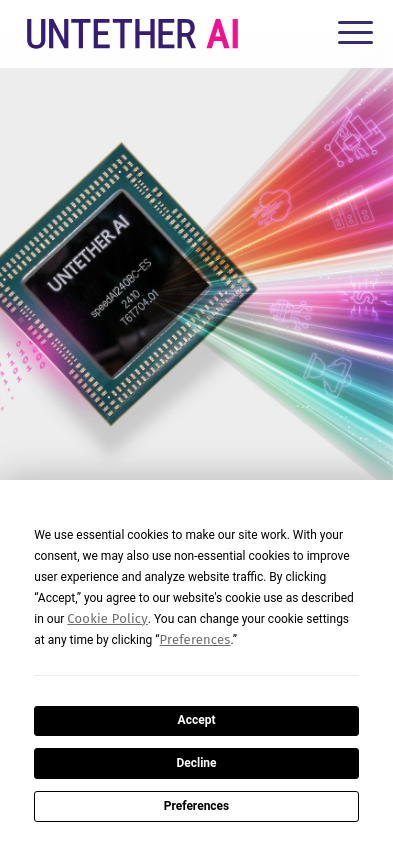
Untether AI focuses on improving AI inference efficiency and reducing energy consumption, developing the SpeedAI accelerator cards for enhanced performance in AI applications.
Key Focus Area
Untether AI is concentrated on enhancing AI inference performance for various applications through the creation of advanced hardware solutions. Their primary aim is to facilitate the deployment of artificial intelligence (AI) from the cloud to the edge across multiple sectors, such as AgTech, automotive, government, and financial services. They focus on accelerating AI inference tasks, promoting performance, energy efficiency, and cost-effectiveness.
Unique Value Proposition and Strategic Advantage
Untether AI’s unique value proposition lies in its novel at-memory compute architecture. This architecture positions the processing element directly next to memory cells, thereby reducing the power consumption associated with data movement, which traditionally dominates AI workloads. This setup diminishes the need for larger data transfers, leading to significant operational efficiency and exceptionally high compute density, making it particularly appealing for high-performance, power-sensitive AI applications. Their products offer energy-efficient AI operations, which claim to outperform traditional systems by providing higher throughput and lower power usage.
Delivery on the Value Proposition
To achieve their value proposition, Untether AI delivers a suite of products comprising integrated circuits (ICs), accelerator cards, and software development kits:
-
AI Inference Accelerator ICs: These include the runAI200 and the speedAI240. The ICs exploit an at-memory architecture for optimal compute density and low power consumption. They support a variety of AI workloads, from vision-based networks to transformer networks, catering to needs across automotive, finance, agriculture, and government sectors.
-
AI Accelerator Cards: Untether’s cards, such as the tsunAImi tsn200 and tsunAImi tsn800, are designed for high-demand inference tasks, delivering substantial performance in a power-efficient manner. They incorporate features suitable for both server-grade and edge applications, making AI deployment more broadly feasible.
-
Software Development Kit (imAIgine SDK): This SDK enables seamless model transition from popular frameworks like TensorFlow and PyTorch to Untether AI’s hardware. It offers a Model Garden and custom development flows that support the rapid deployment of AI solutions, emphasizing ease of integration and operational flexibility.
-
Target Markets and Applications: Untether AI focuses on sectors like agricultural technology (AgTech), automotive, financial services, and government applications, where AI can deliver substantial improvements in operational efficiency, safety, and sustainability. For example, in AgTech, AI assists in precision farming and crop monitoring, while in automotive, it enhances advanced driver-assistance systems (ADAS).
Overall, Untether AI emphasizes an innovative approach to overcoming AI deployment challenges, delivering higher performance and efficiency through a unique hardware design that benefits from reduced power consumption and increased density of compute resources. Their strategic partnerships and compliance with industry standards further support their market positioning in enabling AI across diverse operational environments.
AMD

AMD is a key player in the AI hardware market, holding the position as the second player in market valuation, offering competitive chips like the MI350.
-
Key Focus Area: AMD primarily focuses on designing and manufacturing semiconductor products. Their key focus is on processors for various computing needs, including high-performance CPUs and GPUs for both personal and business use. They target multiple sectors such as gaming, data centers, personal computers, and professional workstations, emphasizing AI integrations into their product offerings.
-
Unique Value Proposition and Strategic Advantage: AMD positions itself as a provider of high-performance computing solutions that seamlessly integrate AI capabilities. The company markets its Ryzen™ processors as the first x86 processors with dedicated AI engines, claiming to bring advanced AI functionalities directly to PCs. This integration allows for local AI processing, enhancing privacy and security, which AMD considers a strategic advantage over cloud-dependent AI solutions. AMD emphasizes leadership in power efficiency and processing speed, presenting AMD Ryzen™ and EPYC™ processors as optimized for enterprise-grade performance with security and manageability features built-in.
-
Delivery on Value Proposition: AMD delivers on its value proposition by incorporating AI engines and adaptive SOCs into its processors, enabling users to manage intensive computational workloads and AI-enhanced tasks locally. They provide a comprehensive suite of processors that are optimized for specific industries—from gaming and high-performance computing to AI-driven business solutions and media production. AMD also collaborates with major OEMs and partners to ensure that their processors are widely available in consumer and enterprise products, promoting seamless integration. Additionally, they offer an extensive software ecosystem, including ROCm™ and professional management tools, to enhance the capabilities and integration of their hardware solutions. Product stability, long-term availability, and enhanced security are actively highlighted as essential features that meet business and industrial demands. Through strategic partnerships and a commitment to innovation in AI and processing technology, AMD aims to support and advance enterprise workflows comprehensively.
Intel
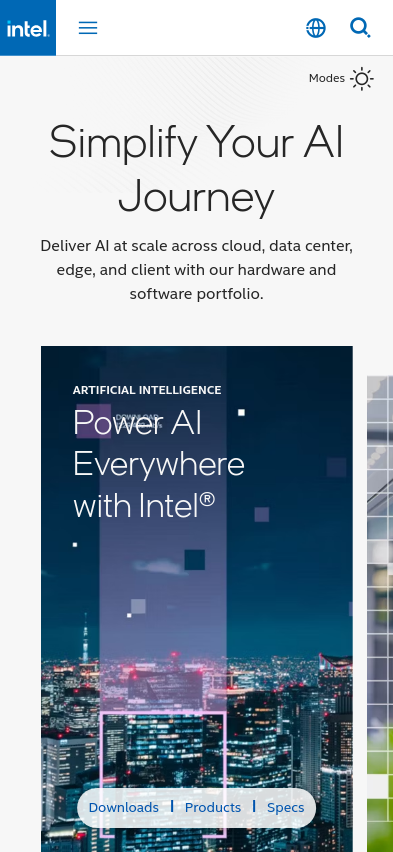
Intel is a market leader in CPUs, expanding its influence in the AI sector with products like the Gaudi 3 chip, aiming to catch up in the GPU arena.
Leadership | About | About | Leadership | About | About
Intel's Strategic Focus and Deliverables
1) Key Focus Area:
Intel is highly focused on Artificial Intelligence (AI) innovation across various industries and technological platforms. Their efforts span from traditional areas like processors and computing hardware to cutting-edge solutions that integrate AI across data centers, cloud computing, and enterprise systems.
2) Unique Value Proposition and Strategic Advantage:
- Open Platform for Enterprise (OPEA): Intel provides a comprehensive AI ecosystem that includes silicon, software, and tools, allowing enterprises to harness AI's potential across devices from PC to edge and data centers. This strategy is aimed at various industries, including financial services, manufacturing, healthcare, and retail.
- AI-Powered Performance: Their newest product offerings, such as the Intel® vPro® PCs and Core™ Ultra processors, are tailored to enhance productivity with integrated AI capabilities, improving everything from security to computing efficiency.
- Scalability and Edge Solutions: Intel's platforms, such as the Tiber™ AI Cloud, are designed to streamline the deployment of AI solutions at an enterprise scale and across edge environments.
- Enterprise Solutions: Intel underscores the capability of their systems to glean actionable insights from data, driving automation and enhancing decision-making processes, which serves as a significant business advantage to clients.
3) Delivering on the Value Proposition:
- Comprehensive Product Portfolio: Intel offers a wide range of products including processors (Intel® Core™ Ultra and Intel® Xeon®), graphics solutions with their Arc™ series, and AI accelerators, which support AI workload demands.
- Tools and Partnerships: With resources like the OpenVINO™ toolkit for AI model optimization and the oneAPI Toolkits for unified programming, Intel caters to developers seeking efficiency and innovation. They also leverage extensive partnerships for joint solutions and industry standards.
- Enhanced Security and Manageability: Intel platforms focus on security with hardware-level protections and remote management capabilities, critical for enterprise environments.
- Empowering the Workforce: Solutions like Intel vPro® are aimed at fortifying businesses with robust security tools and optimizing device management, thus allowing tech teams to focus more on innovation than maintenance.
- Development Resources: Through its Developer Zone and resources, Intel promotes easy access to its software tools and solutions that support innovation, scalability, and performance optimization. This aids developers in crafting solutions easily across various technology stacks.
- Evidence of Impact: Intel documents case studies, such as those with financial and agriculture sectors, demonstrating their AI solutions achieving significant efficiency improvements and cost reductions.
Final Thoughts:
Intel continues to strategically position itself as a provider of diverse technological platforms and solutions, placing special emphasis on AI innovations. By emphasizing scalable and secure solutions supported by a robust hardware and software ecosystem, Intel aims to not only meet but guide the evolving demands of enterprise-level computing and AI applications.
Verta.ai

Verta.ai focuses on ML model management, offering a platform for model version management and production launching. Founded by Dr. Manasi Vartak, based on MIT CSAIL research.
DEI | About | About | News | About | Locations | Contact | Contact | Careers | Leadership | About | About | About
Executive Summary of Cloudera's Positioning and Offerings
1) Key Focus Area: Cloudera concentrates on providing enterprise-level data solutions that integrate AI and machine learning (ML). Their focus is on assisting organizations to derive business insights from their data through a hybrid data platform. This platform supports modern data architectures by blending capabilities across data engineering, AI, machine learning, and analytics.
2) Unique Value Proposition and Strategic Advantage: Cloudera’s unique value proposition lies in its hybrid data management platform that facilitates extensive scalability and agile data processing across various infrastructures—cloud or on-premises. Specifically, Cloudera emphasizes:
- Hybrid Data Platform: It is branded as the only hybrid data solution for modern data architectures, enabling organizations to manage data anywhere while leveraging enterprise AI.
- AI Inference Services: The platform enhances generative AI (GenAI) development capabilities, displaying an edge in AI model deployment and lifecycle management.
Strategically, Cloudera stands out by offering:
- Comprehensive MLOps Tools: These facilitate continuous model management and lifecycle governance ensuring AI models remain accurate and secure.
- Extended SDX (Shared Data Experience): Offers unified governance for data and models, enabling transparency and automation in data operations.
3) Delivery on the Value Proposition: To deliver its strategic offerings, Cloudera has developed several solutions and products aimed at various data and IT leaders, data practitioners, and across multiple sectors such as finance, technology, healthcare, and more.
Key aspects of delivery include:
- Platform Features: Cloudera provides containerized workspaces with automated compute resource allocation, enabling seamless model training, deployment, and inference.
- Data Science Tools: The platform includes exploratory data science capabilities and Accelerators for ML Projects (AMPs), allowing for rapid and reusable AI application development.
- MLOps and Workflow Integration: Users benefit from integrated environments with workspaces facilitating model deployment, data visualization, and insights delivery through intuitive interfaces.
- Deployment Flexibility: Cloudera AI can be deployed across cloud and on-premises infrastructures, emphasizing a cloud-native, portable experience that screens against vendor lock-in through multi-cloud readiness.
In summary, Cloudera offers a comprehensive platform for organizations to advance their data-driven initiatives through innovative data management and AI technology solutions. These solutions are designed to not only optimize existing data practices but also scale with future technological advancements. The strategic focus on hybrid and scalable solutions provides a notable edge amidst competitive data and AI landscape—aiding businesses to streamline their data science operations and accelerate AI adoption.
Mighty AI

Mighty AI provides training datasets and models for artificial intelligence applications. It focuses on computer vision and natural language processing to enhance machine learning capabilities.
Aurora Innovation Inc.: Overview and Strategic Insights
1. Key Focus Area: Aurora Innovation is primarily dedicated to the development and implementation of autonomous driving systems. The company's core product, the Aurora Driver, is a sophisticated autonomous driving technology designed for both freight and passenger transportation. They aim to revolutionize the logistics and ride-hailing sectors by integrating this technology into vehicles ranging from sedans to semitrucks.
2. Unique Value Proposition and Strategic Advantage: The central value proposition of Aurora lies in its high-level autonomous driving system, which promises enhanced safety, increased operational efficiency, and a more consistent driver supply.
- Autonomous Technology: The Aurora Driver's core strength is its advanced sensing and computing system, which can handle complex driving environments and integrate into a wide range of vehicles. Aurora's proprietary FirstLight Lidar extends visibility up to 400 meters, promising quick reaction times and safety.
- Industry Collaborations: Strategic alliances with industry leaders like Volvo, PACCAR, and Toyota, along with Uber for ride-hailing, demonstrate their commitment to a collaborative approach in scaling autonomous vehicle technology. These partnerships are crucial for developing vehicles that both accommodate the autonomous systems and are manufacturable at scale.
- Scalability in Freight: Aurora is developing freight solutions that address current challenges like driver shortages and efficiency. By offering technology that bypasses human driver limitations, they propose solutions that could significantly reduce transit times.
3. Delivering on the Value Proposition: Aurora achieves its strategic aims through several key initiatives:
- Comprehensive Autonomous System: The Aurora Driver combines a robust hardware and software architecture, employing high-definition mapping and simulation to teach and test its systems virtually, ensuring that the technology continues to learn and adapt.
- Pilot Programs and Real-world Testing: Using partnerships with logistics companies and automakers, they conduct pilots to integrate their technology into existing networks. These pilots help refine the autonomous systems for real-world conditions and help their partners transition smoothly into using the technology.
- Safety as a Cornerstone: Safety is emphasized through the company’s Safety Case Framework, which outlines the foundational safety underpinnings of their technology, development processes, and organizational behavior. This includes a safety management system that reviews and acts upon any reported concerns.
- Integration with Logistics Systems: The Aurora Driver supports logistics companies by offering seamless integration with existing transportation management systems. This allows businesses to adapt quickly and potentially realize efficiency gains.
- Commitment to innovation: Aurora continues to invest in technological advancement and scalability, backed by significant funding and strategic financial management.
In summary, Aurora Innovation positions itself as a trailblazer in autonomous technology with multi-industry applications. Their strategy is rooted in leveraging advanced technology, forming strategic partnerships, and prioritizing safety to drive adoption and transform both the freight and ride-hailing industries.
Vectra

Vectra AI specializes in AI-powered threat detection and response solutions aimed at enterprise cybersecurity across various environments.
- Key Focus Area
The company's key area is cybersecurity, specifically specializing in detecting and responding to sophisticated cyber threats across hybrid cloud networks. They emphasize using AI-driven detection and response solutions for a comprehensive defense against various types of cyber attacks, including those targeting telecom infrastructure. Their platform provides coverage for different environments like public cloud, SaaS, network, and identity systems.
- Unique Value Proposition and Strategic Advantage
Vectra AI's strategic advantage lies in its AI-driven "Attack Signal Intelligence," which is designed to deliver accurate, real-time detection of security threats while minimizing alert noise that can overwhelm security operations centers (SOCs). This unique intelligence is positioned as being capable of finding advanced threats that other solutions may miss. Furthermore, the platform supports context-enriched analytics and integrates with various security tools to streamline threat detection and response processes across diverse attack surfaces. Their extensive use of AI and machine learning enhances the ability to monitor behaviors and provide clarity in identity-based threats.
- Delivery on their Value Proposition
-
AI-Driven Detection: Vectra AI's products leverage AI, with over 150 behavior-based detection models for monitoring activities across networks and identifying potential security breaches in real time. This includes detecting behaviors even within encrypted traffic without needing decryption.
-
Integrated Security Solutions: Their platform integrates multiple security functions on a single interface, reducing detection latency and providing comprehensive network coverage.
-
Customizable and Scalable: Their solutions are designed to be flexible, allowing integration with existing security systems through open architectures, which enables organizations to tailor their cybersecurity measures according to specific needs.
-
Reduced Analyst Workload: By employing AI to handle initial threat sorting and prioritization, Vectra AI reduces the alert burden on SOC teams, allowing analysts to concentrate on significant threats more effectively.
-
Managed Detection and Response Services: They offer Managed Detection and Response (MDR) services to help organizations that may lack the internal resources to maintain a round-the-clock security posture. This service helps augment existing security teams with Vectra AI's expertise.
-
Focus on Emerging Threats: Strategic efforts include solutions for modern challenges such as identity protection, ransomware, and supply chain attacks, indicating their focus on evolving threat landscapes.
Overall, Vectra AI positions itself as a proactive solution for organizations aiming to preemptively manage their cybersecurity risks with the help of innovative AI technologies, particularly those dealing with complex, hybrid environments. They claim their systems are scalable, adaptable, and provide a strategic advantage in detecting and nullifying threats early in their progression.
RaiderChip

RaiderChip is developing a hardware IP core to accelerate generative AI inference on FPGA platforms, emphasizing small to large language models.
Company Focus Area
RaiderChip is a hardware design company specializing in developing neural processing units (NPUs) for generative artificial intelligence (AI). The company's primary focus is accelerating large language models (LLM) on low-cost field-programmable gate arrays (FPGAs). These accelerators aim to advance AI processing efficiency and operate generative AI models entirely locally, without requiring cloud or subscription services. RaiderChip aims to target the burgeoning edge AI market, engaging in embedded solutions capable of running independently from internet connections.
Unique Value Proposition and Strategic Advantage
RaiderChip's unique value proposition lies in offering clients a cost-effective, local AI acceleration solution that prioritizes privacy and efficiency. Their strategic advantage comes from leveraging decades of experience in low-level hardware design to deliver NPUs that maximize memory bandwidth and computational performance, essential for running complex generative AI models efficiently. RaiderChip offers versatile and target-agnostic solutions that work seamlessly with FPGAs and ASIC devices from various suppliers such as Intel-Altera and AMD-Xilinx.
Key differentiators include:
- Fully hardware-based generative AI acceleration, ensuring deterministic performance and energy efficiency.
- Capability to run models offline to ensure data privacy and independent operations, ideal for applications in sensitive areas such as defense, healthcare, and consumer electronics.
- Support for rapid integration of new LLMs and customer-specific fine-tuned AI models without hardware modifications.
Delivering on Their Value Proposition
To drive its mission forward, RaiderChip focuses on several key strategies:
-
Advanced Technology and Design: Their NPUs are specifically optimized for the Transformers architecture, which is foundational for the majority of LLMs. This allows them to process models without the need for additional CPUs or Internet connections.
-
FPGA-based Approach: RaiderChip uses the reprogrammable nature of FPGAs, making their deployed systems adaptable to emerging AI models and updates without significant hardware changes.
-
Quantization Support: By offering models with full floating-point precision and quantized variants, RaiderChip caters to diverse computational needs, providing flexibility and efficiency, especially in resource-constrained environments.
-
Local and Interactive Evaluations: RaiderChip provides interactive demos that allow potential customers to test and evaluate the capabilities of their generative AI solutions, emphasizing a hands-on approach.
-
Frequent Model Support Expansion: Aligning with market trends, they consistently add support for new models like Meta’s latest Llama releases and Falcon from TII of Abu Dhabi, enabling versatile AI applications across different languages and regions.
RaiderChip’s investments in research and development are supported by their recent seed round of one million Euros, further accelerating their growth in a field that continuously evolves with rapid technological advancements. By focusing on local AI acceleration for both performance and privacy, RaiderChip positions itself as a pioneer in generative AI deployment, particularly for applications requiring significant computation near the source of data generation or decision-making.